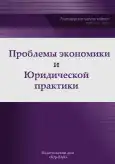To the Question of Criminal Liability for Crimes in the Sphere of Taxation
- Authors: Kardanov R.R.1, Simonova S.V.2
-
Affiliations:
- North-Caucasian Advanced Training Institute (branch) of the Krasnodar University of the Ministry of Internal Affairs of Russia
- Volgograd Academy of the Ministry of Internal Affairs of the Russian Federation
- Issue: Vol 18, No 3 (2022)
- Pages: 258-261
- Section: Articles
- URL: https://bakhtiniada.ru/2541-8025/article/view/147168
- ID: 147168
Cite item
Abstract
Full Text
##article.viewOnOriginalSite##About the authors
Ruslan R. Kardanov
North-Caucasian Advanced Training Institute (branch) of the Krasnodar University of the Ministry of Internal Affairs of Russia
Email: lel4993@mail.ru
Cand. Sci. (Law), Police Colonel, Head of the Department of Organization of Law Enforcement Activities Nalchik, Russian Federation
Svetlana V. Simonova
Volgograd Academy of the Ministry of Internal Affairs of the Russian FederationCand. Sci. (Law), Police Colonel, Head of the Document Research Department Russian Federation
References
- Aspidov A.V., Nametkin D.V., Panov A.Yu. Topical issues of organization of investigation and counteraction to tax crimes // Law and state: theory and practice. 2022. No. 1 (205). pp. 117-120.
- Efimova V.V. Forensic features of modern tax crimes and their difference from other tax offenses // Taxes. 2022. No. 1. P. 37-40.
- Kondratkova N.V. Criminal law characteristics and problems of qualification of tax crimes: study guide. 2022. 168 p.
- Nikolaeva Zh.A. Politics in the sphere of responsibility for tax crimes in the Russian Federation and abroad (comparative aspect) // Socio-political sciences. 2020. No. 4. P. 91-98.
- Novgorodtsev V.M. Problematic issues of identifying the investigation and qualification of tax crimes // Bulletin of the Moscow Humanitarian and Economic Institute. 2021. No. 3. P. 306-313.
- Reshnyak M.G. Tax crimes as an encroachment on the economic security of the Russian Federation: criminal law countermeasures // Modern law. 2021. No. 9. P. 81-86.
- Hit the jackpot: economic crimes cost the country more than others // Izvestiya. URL: https://iz.ru/1280597/ivan-petrov/sorvali-kush-dorozhe-drugikh-strane-oboshlis-ekonomicheskie-prestupleniia (date of access: 06/06/2022).
- The Criminal Code of the Russian Federation of 06/13/1996 No. 63-FZ (as amended on 03/25/2022) // Collection of Legislation of the Russian Federation. 1996. No. 25. Art. 2954; 2022. No. 13. Art. 1952.
Supplementary files








